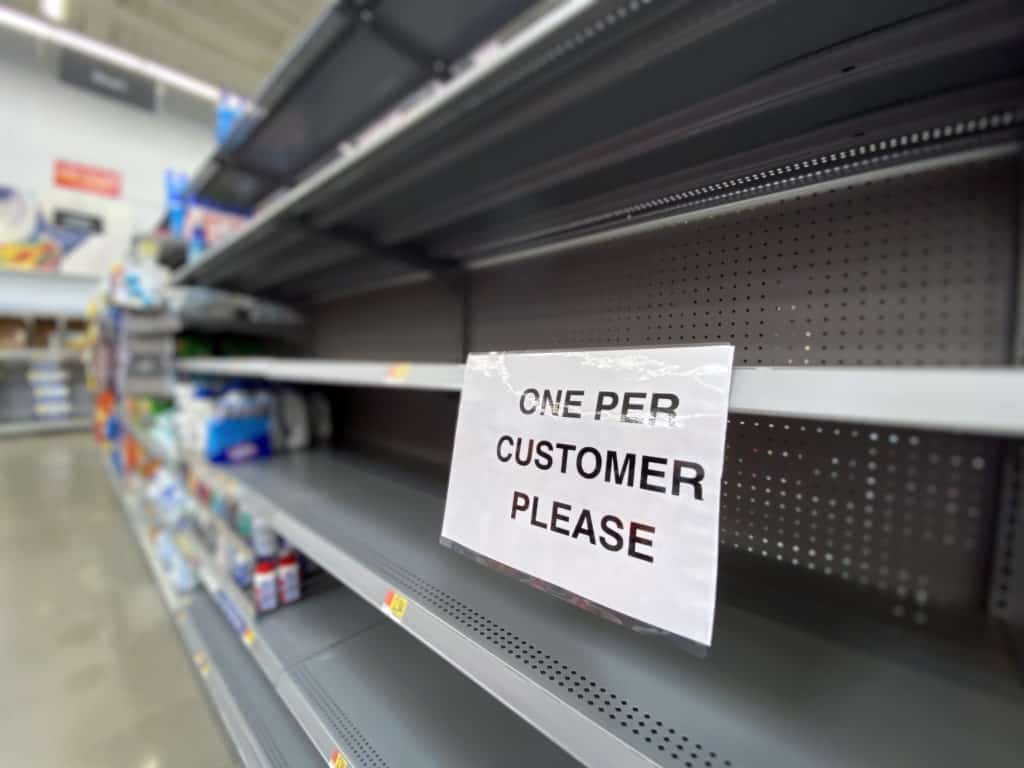Why toilet paper?
Behavioral science insights into the rush on toilet paper during the COVID-19 crisis.
By Kurt Nelson, PhD & Tim Houlihan
Toilet Paper – Really?
It seems almost laughable when you think about it rationally. Seriously, why would anyone feel the need to run out and buy bundles of extra toilet paper in a health crisis that isn’t impacting the supply of toilet paper, the delivery of toilet paper, doesn’t require additional use of toilet paper (well, except for that extra bit that we’re staying at home), and literally has nothing to do with toilet paper?
But that’s what happened and is still happening at this writing.
The mass buying spree to acquire toilet paper in bulk was a clear sign we were in a crisis. Even today, weeks after the first rush, there are still empty shelves in the toilet paper aisle of many stores around the U.S. and, indeed, the world.
Is there something that we don’t know about the toilet paper supply chain? Is it a major play by toilet paper manufacturers to up their sales? Okay, that sounds like a conspiracy theory. But we have to wonder.
Or are there reasons that can be understood if we start to think about this from a human psychology perspective?
As part of our Behavioral Grooves podcast series on the behavioral science implications of the COVID-19 crisis, we asked several behavioral science experts that very question. What they had to say was informative, some of those conversations brought us surprising answers, and none of the conversations brought up Freud.
Last Disaster Syndrome
Annie Duke, the author of “Thinking in Bets,” is always a fountain of great ideas, so we expected that our conversation about hoarding toilet paper would be insightful. She identified that people often respond based on their personal or societal history. The question she believes we should be asking is, “What was the last disaster in everyone’s mind?”
Of course, the answer varies by country.
In Congo, the last disaster was Ebola. In Southeast Asia, it was SARS. In the United States, it was a hurricane or other weather disasters. Annie relates, “In those [weather disasters], it’s very hard to get supplies in. Things are flooded. There might be no electricity. Stores can’t open, or you can’t get to them, and then you run out of toilet paper. So, when you’re thinking about what are the lists of things that you would want to have on hand for a hurricane, toilet paper is one [important item.]”
This aligns with Dr. Ali Fenwick, from Hult International University in London, who stated, “So in a hurricane situation or natural disaster, it’s a very similar situation. People run out because they know there’s not going to be much left…so they go out and buy it.”
It’s a novel idea, and a valid one, that the last disaster in memory influences the readiness of the countries and their quickness to respond. If the last disaster reminds us of masks, ventilators, and quarantines, we’ll prepare for the next disaster differently than if we’re reminded of a lack of clean water and interrupted supply chains.
Social Norms and Herd Mentality
How strong is the need for social conformity? Strong enough for a social scientist to second guess his grocery list when he saw the toilet paper aisle nearly empty. Though he didn’t have toilet paper on his list, he felt compelled to reconsider his original intentions when he saw the shelves in near-naked condition.
Eugen Dimant, Ph.D. at the University of Pennsylvania, candidly spoke to the power of social norms in this experience when he asked himself, “If everyone else believes they need toilet paper, I should too.”
He explained that the way social norms are viewed impacts how we respond. There is a difference between injunctive norms (“I don’t really need to buy in bulk because the toilet paper factories are fine.”) and descriptive norms (“Everyone is buying toilet paper, maybe I should, too.”). We don’t always believe injunctive norms, but we do descriptive norms. So, leaders telling us not to worry about toilet paper (injunctive) isn’t as powerful of a motivator as seeing news reports of the toilet paper aisle being empty (descriptive).
An alternative way of expressing this came from Christian Hunt, the founder of Human Risk in London. Christian framed it this way: “I think what happened here was a bit of herd mentality. And this is where social media and the media don’t help. I go into a store, and what is one of the most noticeable things when it’s empty on the shelves is the answer is toilet rolls because they are massive.” We see that other people are stupidly buying toilet paper in bulk, but it creates this inner herd mentality to copy them.
Herd mentality was also picked up by Ali Fenwick. He agreed that, “There’s a lot of herd behavior going on… when we don’t know what’s happening, when we don’t know what to do, we tend to follow other people, especially other people similar to us.”
And he went on to remind us that it’s extraordinarily difficult, in the moment that we’re making sure we stay alive, to get beyond asking the question about what the rest of the tribe is doing. We can react much faster if we just glance at the shelves and think to ourselves: “If the shelves are empty, it must be for a good reason.”
Ali reminded us that under such high levels of uncertainty, we tend not to think rationally. “When we are put into an uncertain situation or a situation which is perceived as threatening, survival mode starts to kick in…and rational thinking goes out the window,” he noted. And that’s a fascinating aspect to this whole thing: these reactions happen without a single thought – they’re automatic.
Annie brought a slightly different perspective on the idea of herd mentality. “It’s a little game theory problem,” she says when indicating that we’re making a quick calculation in our heads. “Like if everybody’s doing it [hoarding toilet paper], then, if I wait too long, I won’t even be able to get one role.” At some point, we realize that there may be a run on toilet paper, and thus, we need to “get ours” before it runs out. And while this bends toward the scarcity effect, it’s a very real form of scarcity: there might not be any toilet paper left on the shelves.
Risk Perception
Christian is an expert in human risk, and he tended to view the hoarding toilet paper as a way to minimize our risk. Humans have adapted as a species as excellent risk avoiders, and buying toilet paper helps us feel comfortable that we’re avoiding risk. There is a cost to not having toilet paper (i.e., risk); however, he points out that our perception of risk is somehow contaminated. He notes that we have plenty of “alternatives for toilet paper,” but we don’t really have any alternatives for food.
So why aren’t food supplies in short supply, he wonders? He claims our risk response in this situation is out of whack. He also challenged the way we tend to think about situations like this: “I would argue that managing the inputs is more important than managing the outputs.”
Deborah Small, Ph.D. from the Wharton School of Business, talked to us recently about the way humans can have a distorted perception of risk. It’s very easy for us to identify that there is a risk, but more challenging to determine the correct level of that risk. It’s more likely we’ll undervalue it or overvalue it than hit it on the nose.
She shared an observation with us: “Each day we learn more about new cases and new locations. But the news doesn’t write about nothing happening, right? So, we don’t know about all those people who travel through airports and were just fine. [What we end up with is] this kind of biased feedback about what’s happening.”
Much like the way we tend to be highly aware of breast cancer because we see (and know) lots of survivors, the lack of toilet paper is highly visible. It is top of mind, which makes us aware of the risk.
Closing Thoughts
Without argument, we can agree that people are complex. As Annie Duke mentioned during our conversation, complexity is different from complicated, which is the world that watchmakers and chess players live in. Complexity is different, though. Complexity refers to the number of levels within a system, and we humans have many, many levels. Complex systems easily overload our prefrontal cortex and our higher-level decision making. In dire situations, higher-level thinking is overrun by our reptilian brain – the flight or fight behaviors.
And, of course, our behaviors are influenced by the complexities of the context of the situation, our DNA, how we grew up, and myriad other things. That’s why it’s okay that we have many explanations for the simple act of hoarding toilet paper.
Imagine that if a robot hoarded toilet paper, there would probably be a straightforward explanation. However, understanding why people hoard toilet paper necessarily generates more than one answer. These answers will, with any luck, get you thinking differently.
We hope you give it some consideration and drop us a line. What other reasons in the behavioral science pantheon do you think could apply to this situation?
BEHAVIORAL GROOVES BLOG
- August 18, 2022 Improve Performance Using 12 Action-Oriented Words
- August 4, 2022 Groove Track: Why You Can’t Find a Cab on a Rainy Day!
- July 21, 2022 Mind Over Milkshakes: how our expectations change reality
- April 12, 2022 How One Man’s Social Identity is Inspiring the World
- February 11, 2022 Sweet Regret
- January 12, 2022 How to craft powerful goals – for you and your team!
- January 29, 2021 Being a Catalyst For Change with Jonah Berger (Bonus Track)
- November 13, 2020 The rule of 4 and other hints to improve your life with Roy Baumeister (Bonus Track)
- November 13, 2020 Using priming to improve your life – our interview with Dr. John Bargh (Bonus Track)
- October 23, 2020 Using moral arguments to change opinions with Andy Luttrell (Bonus Track)
- September 29, 2020 Habits vs Routines
- September 29, 2020 Good Prime – Bad Prime
- April 8, 2020 Why toilet paper?












